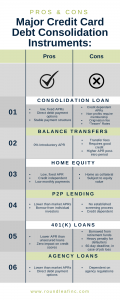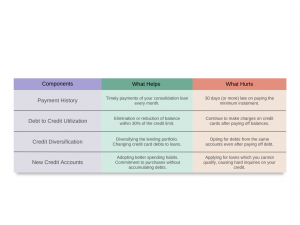How to Consolidate Credit Card Debt

What does it mean to consolidate credit card debt?
Like any other debt consolidation program, credit card debt consolidation is basically bringing all your scattered multiple credit card payments under one joint payment scheme. Consolidating debt simplifies (and sometimes reduces) your monthly payments, can reduce interest rates, and ultimately frees up more opportunities to save. There are multiple ways that you can go about this.
Three primary factors determine the best consolidation option:
- The amount you decide to pay off (within the plan)
- Your current financial state to support that decision
- The strength of your credit history for more flexibility
Is it a good idea to consolidate credit card debts?
If used correctly, credit card debt consolidation is a good choice for many. Consider two scenarios:
A)Your credit card payments are due, and interest is accumulating every month. Interest rates are high, and payment timelines are limited. If you have multiple bills like this, then paying the minimum payment amount is only stalling the inevitable. You end up taking more debt to sustain a your lifestyle. At some point, this will all spill over your monthly income. You will become bankrupt.
B)You take a loan with a much lower interest rate and pay off all credit card bills at once. Now you won’t be hounded by multiple creditors for payments. Bringing all payments under one roof brings you back into control and makes the payment process more transparent and reduces the minimum monthly payment as well.
The result being that you pay less per month, you pay to one creditor, and your credit score stays intact. You may end up paying more in terms of the total interest in the long run, however, consolidating debts gives you time to sort out your financial situation in the meantime. You just need to pay attention to ensure completion.
Some simple rules to make consolidation work in your favor:
Do’s
- Do it yourself only when you have good credit to back you up. There is no shame in asking for help.
- Be mindful of your debt-to-income ratio. Ensure that your consolidation fees are worth the debt you are paying.
- Be mindful of the long-term costs. You need to set up contingencies for the repayment of the loan.
- Be cautious about new financing. Focus more on your needs than what’s available.
- Check credit score once the debt is paid in full. Review closed accounts, zero balances, payment dates.
Dont’s
- Don’t make new charges on your paid off accounts. Otherwise, you’re setting yourself for failure.
- Don’t convert unsecured debt to secured debt. For large amounts, you may have to put up collateral.
- Don’t lose steam midway. There will be hardships, but in the end, it will be worth it.
- Don’t confuse consolidation with debt settlement. Debt consolidation pays back the entire amount; settlement reduces it.
- Don’t repeat past mistakes. Set up a budget to figure out the reasons behind your crisis.
- Avoid past mistakes in the future to stay out of debt.
How much can you save by consolidating credit card debt?
Because they are short-term unsecured loans, credit cards have the liberty to charge a much higher Annual Percentage Rate (APR). With excellent credit to back you up, you can avail personal loans at a much cheaper rate and even pay off your debt much earlier.
Suppose you currently have a total of $10,000 in credit card debt, with 20% APR (average) and $250 in monthly payments. Now, you take a personal loan for the same principal amount with a 3-year repayment plan and 8% APR (minimum average). Not only do you get to pay off your debts much earlier, but you also save $5,645 in the process.
What’s the catch?
The only shortcoming of this formula is that a personal loan or home equity loan will depend on your credit score to assign repayment dates and interest rates. Like the example above, in most cases you need a minimum FICO® score of 680 to take advantage of this loan option.
Should I take out a loan to pay off credit card debt?
Taking out a loan to pay off multiple credit cards has some distinct advantages. Since all the proceeds of this loan are for eliminating other debts, you are not actually borrowing additional money. The new consolidated loan will also be a higher amount, so paying it on time will add to your credit score.
If you are receiving help from credit counseling agencies, you may get added benefits like reduced rates or forgiveness on late fees and charge-offs.
Credit Card Consolidation Loans OR Balance Transfer Credit Cards?
Neutralize unsecured debts with the two deadliest weapons in your consolidation arsenal. One has the option of stable payments and low APRs, in comparison, the other transfers all your debts onto a single card with no interests. Both require good to excellent credit scores, and (depending on your debt load) each can prove to be equally advantageous.
- Credit Card Consolidation Loans (a.k.a. Personal Loans):
Banks, credit unions, and online installment loan lenders often give away personal loans to pay off unsecured credit card debts. These loans consolidate all your debts into one loan account and simplify the payment process. Debt Consolidation loans from non-profit organizations (like federal credit unions) work best if you have a low credit score.
Tip: Opt for trustworthy creditors. The lower interest rates for credit card consolidation loans are often “teaser rates” that lenders use while promoting their offers. Be aware of hidden fees and variable rates.
- Credit Card Refinancing (a.k.a. Balance Transfer Credit Cards):
It’s not a physical “card” so to speak. The idea is to transfer all your credit card debts into one account, with no additional interests charged for a pre-selected period (generally 12-18 months). The regular interest rates are restored after the said period. Many credit card companies offer 0% or low-interest balance transfers to encourage payments.
Tip: Avoid using the balance transfer card for purchases until the transferred debt is fully paid. Otherwise, interest will be counted on those purchases until the entire credit card balance is paid.
What other loan options do I have?
- Home Equity Loans: You can borrow against the sizeable equity of your home to pay off credit card debts. A home equity line of credit (HELOC) comes with lower and fixed interest rates, but your house acts as a collateral.
- Peer to Peer (P2P) Lending: Specific groups of online lenders match borrowers with individual investors. Personal loan rates are lower than those in the market. The approval process varies from lender to lender.
- Loans against 401(k): Borrowing against retirement funds (401(k)) is the Hail Mary you save for last. Once applied, you have to rebuild the investment for the amount you now owe. It is only advisable for people with an extremely poor credit score.
- Loans from Credit Counsellors: Pay your lenders directly through trusted credit counseling agencies. Leverage their ties with different crediting bodies to get below market interest rates.
Pros & Cons of Major Credit Card Debt Consolidation Instruments:

Tips to negotiate with creditors:
1.Go through the income/expense sheet before your call/meeting with the creditors.
2.Don’t deviate from the narrative. Rely on facts and figures.
3.Probe options with reasonable questions. Take notes.
4.Make it a point to resolve concerns with creditors – not collectors.
5.Record every conversation (via mail, call, receipts, or others) with creditors.
6.Discuss agreement with counseling agencies post-call.
Does consolidating credit card debt help your credit score?
Consolidating credit card debts requires the un-consolidated debt accounts to be closed first. These multiple foreclosures may count as charge-offs, and hurt your credit score marginally at the beginning.
On the other hand, you have taken a loan that amounts to more than the total of the debts. So as you continue to pay the loan on time, your credit score will improve gradually, beyond what it was before. This net gain results in an overall improved credit reputation by the time you have paid your consolidation loan in full.
How Debt Consolidation Affects Your Credit Score:

Start rebuilding your credit portfolio with Roundleaf’s all-round credit education programs. Prove your credit-worthiness from our small Q&A test. Get Started!
